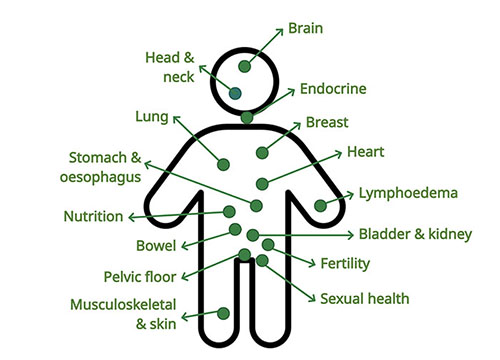Areas of the body

Brain
Radiotherapy can result in changes to memory and concentration or slowing of thought, as well as changes to balance and co-ordination. More rarely, people can develop seizures, strokes or stroke-like migraine attacks.
Breast
Radiotherapy to the breast may result in skin colour change and changes to breast appearance, including changes in shape, size and texture. People can also experience aching or shooting pains in the breast or chest wall, or armpit.
Heart
There is a small increased risk of angina and heart attack following radiotherapy. There is also a risk of scarring of the sac around the heart (pericardium) and changes in heart muscle and valve function.
Lung
Radiotherapy to the lung can result in scarring (fibrosis) which can be seen on scans but which usually does not cause symptoms. Rarely, it can cause breathlessness or cough, and there can be a risk of chronic lung infections.
Lymphoedema
Lymph drainage is affected by radiotherapy which can result in a collection of fluid in the area treated. It is most commonly seen in the face and neck following head and neck radiotherapy, the arm(s) following breast radiotherapy, and the legs following pelvic radiotherapy.
Musculoskeletal and skin
Radiotherapy to the muscles can result in scarring that presents as joint and limb stiffness. Bones may be more prone to fracture and cartilage can be damaged. The skin can change in texture or colour and there may be permanent hair loss in and around the treatment area. The skin can develop small visible spider veins (telangiectasia) and will be sensitive to the sun.
Head and neck
After radiotherapy to the head and neck, people often have a dry mouth and altered taste and they can develop dental problems and jaw stiffness (trismus). Swallowing may be difficult and some people need a long-term feeding tube.
There can be voice changes, the eyes can get dry and people can develop cataracts or other visual problems. There can be changes in hearing, which include hearing loss or tinnitus (ringing in the ears). Radiotherapy to the neck results in a small increased risk of stroke.
Stomach and oesophagus
Radiotherapy can cause chronic inflammation of the stomach, which can result in pain, reduced appetite and nausea. Some people can also develop acid reflux and indigestion. Radiotherapy to the oesophagus can result in long-term irritation, causing a sensation of food sticking, and scarring causing narrowing (stricture).
Bowel
After radiotherapy to the abdomen or pelvis, there can be scarring of the bowel that can make the bowel stiffer, resulting in diarrhoea or constipation, discomfort or pain, mucous discharge and bowel urgency. Sometimes nutrient absorption is affected, resulting in weight loss. Some people develop abnormal blood vessels in the back passage that can cause bleeding.
Pelvic floor
Radiotherapy to the pelvis can result in weakness of the pelvic floor muscles, which can lead to urinary, bowel and sexual function changes.
Fertility
Radiotherapy to the ovaries can lead to early menopause and low oestrogen levels. The uterus can become scarred, affecting its ability to maintain a pregnancy.
Radiotherapy to the testes can result in reduction in sperm count, low testosterone levels and a reduction in size.
Radiotherapy to the brain can affect fertility if the pituitary gland hormones are reduced.
Sexual health
Physical symptoms, body image changes, anxiety, fatigue and loss of libido after radiotherapy may affect relationships. There can be dryness and shortening of the vagina, and the anal area can be more sensitive, leading to painful intercourse. Ejaculation and erections can be affected. Orgasm can feel different.
Bladder and kidney
After radiotherapy to the abdomen or pelvis, people can need to pass urine more often than normal and some have a sudden urge to pass urine. Bladder irritation can result in pain when urinating, and some people have urinary incontinence.
Occasionally, people develop narrowing of the water pipes. Radiotherapy can also result in scarring of the kidneys, reducing their function over time, leading to chronic kidney disease.
Nutrition
Radiotherapy can impact nutrition either directly by affecting eating and digestion, or due to diarrhoea or reduced absorption of nutrients from the bowel.
Endocrine
Radiotherapy to the neck can result in an underactive thyroid gland (hypothyroidism), and radiotherapy to the brain can result in underactivity of the pituitary gland.
Radiotherapy to the abdomen increases the risk of diabetes.

